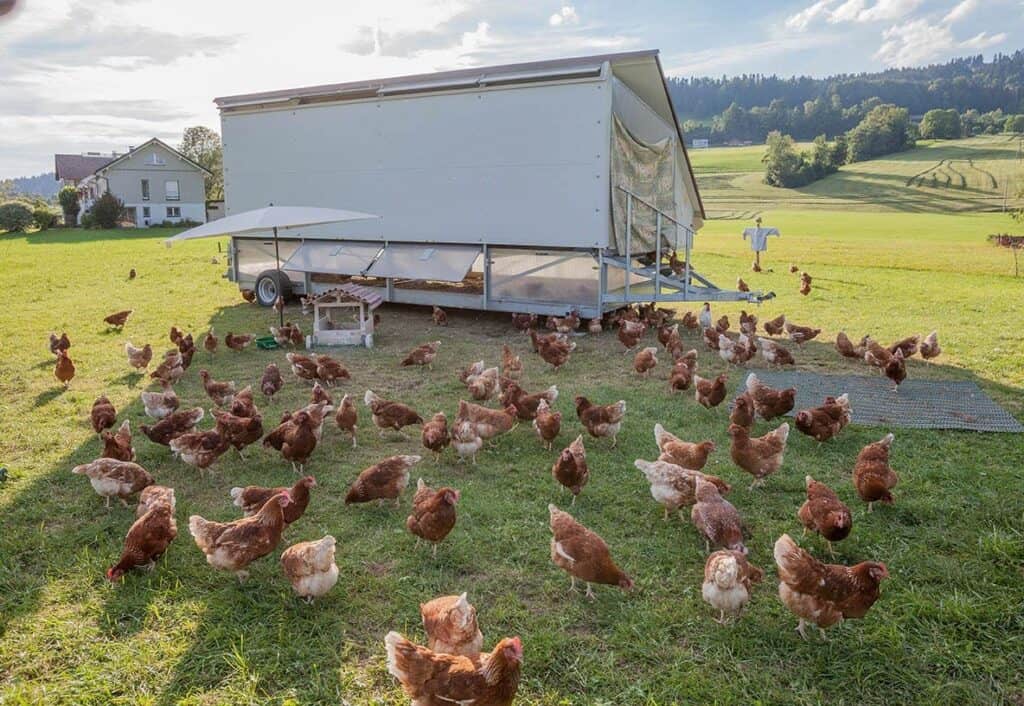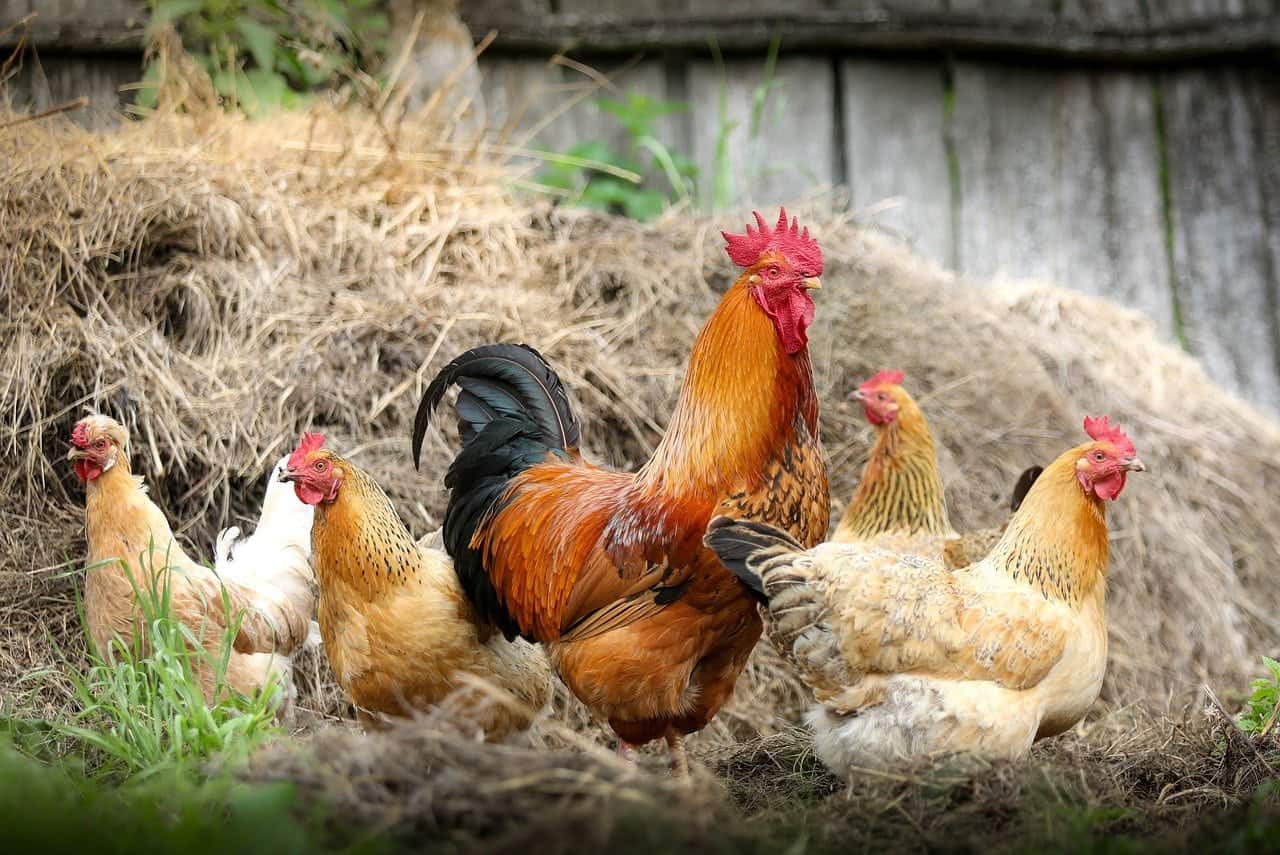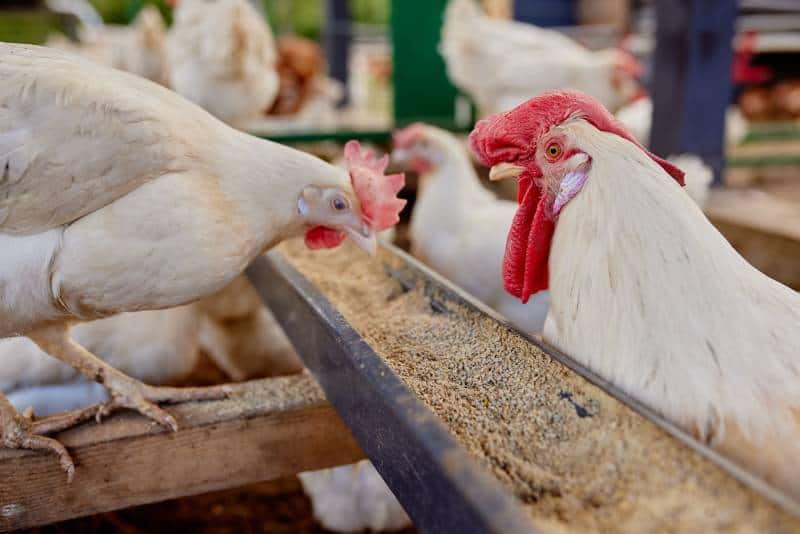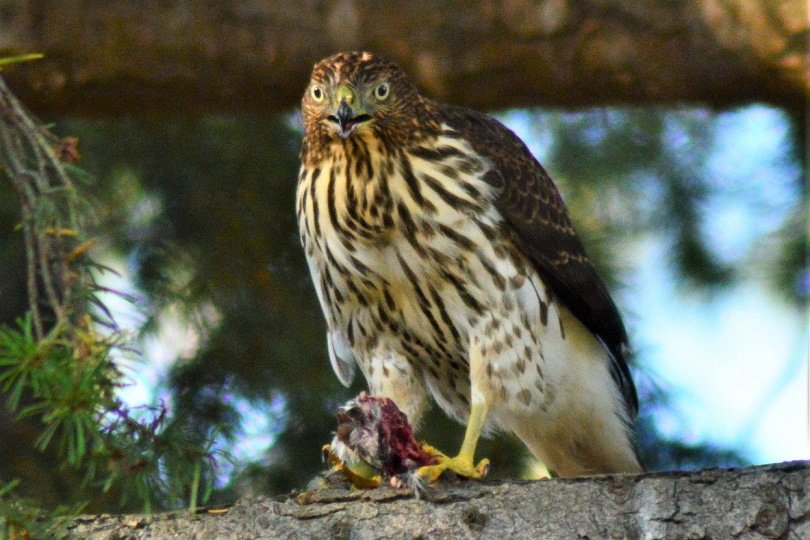Providing your chickens with a free-range environment is beneficial because it ensures your chickens have enough area to roam and stay healthy. Unfortunately, free-range chickens have unique challenges, especially where predators, such as hawks, are concerned.
If you have a problem with hawks, don’t fret. Although hawks are a real concern for chickens, there are things you can do to keep these pesky predators away from your flock. Below, you will find five tips for keeping your free-ranging chickens safe from hawks. Scroll down for more.

Top 5 Ways to Keep Hawks Away From Your Chickens:
1. Provide Cover
The most effective way to keep your flock safe is to provide them ample cover. If able, consider getting a chicken coop complete with mesh wires and a roof. If the coop is completely covered, the hawk will have no way to attack the chickens.
Of course, you don’t want the coop to be small. Make sure that it is large enough to provide your flock enough area to roam safely and happily. If you do not have a large enough coop, just make sure that you provide little safety areas that your chickens can run to and high under in the case of an attack.

2. Add a Rooster to the Flock
Though not always practical, adding a rooster might be of some help. Within a flock, roosters usually take on the role of a sentry, or lookout. As soon as a rooster spies a hawk, he’s likely to start squawking, alerting the other chickens that there is a predator in the area. However, there is no guarantee that this will deter the hawk, or save the flock. It is also entirely possible that the hawk approaches from an angle the rooster isn’t observing.
Roosters are not without their issues, though:
- If you are rearing chickens for profit, the rooster is an additional animal you have to feed.
- Roosters crow, and this might contribute to noise pollution where you stay. In some areas, roosters aren’t allowed to be kept as backyard pets for this reason.
- Roosters may mate with hens and the eggs that your hens produce will be fertilized (this is usually not desired when chickens are reared for egg production).
- In mixed flocks, roosters will fight with other roosters and bully juvenile roosters to establish dominance over them.
If you’re raising chickens as pets and noise isn’t an issue where you reside, then adding a rooster to your flock is a perfectly reasonable option and the presence of a rooster will definitely assist in flock dynamics.
However, if you’re raising chickens for a profit, a rooster might not be a good fit for your flock for the reasons mentioned above. However, if you are raising chickens to sell fertilized eggs, a rooster is required.

2. Get a Black Chicken
In addition to getting a rooster, you can add a black chicken to the flock. No, black chickens are not any more aggressive than a regular chicken, but the black coloration is likely to deter hawks from coming near the roost. That’s because hawks are enemies of crows, which are also black. Adding a black chicken to the roost may confuse hawks and make them think that a crow is in the area.
3. Adopt a Livestock Guarding Dog
A livestock-guarding dog breed is perhaps your best bet if you have a free-ranging chicken flock. These dogs are excellent at deterring would-be predators, including hawks. As an added bonus, they also help keep your flock protected from other predators as well. They are considered efficient against foxes too.
4. Set Up a Scarecrow
Another idea is to try hanging up some scarecrows. Scarecrows have been used for scaring away predatory birds for a long time. However, your chickens may at times stray away from a scarecrow and be vulnerable to attack. In addition, the scarecrow might inadvertently provide a vantage point for some predators, and therefore isn’t a guaranteed form of protection for your flock and something you should only consider as an extra precaution.

5. Cover Feeders
One place where many chickens are victims of hawk attacks is around the feeder. Hawks quickly figure out that feeders are the prime location to attack chickens since the chickens congregate to where the feeder is.
Because feeders can be such a dangerous location for chickens, make sure all feeders are covered. Better yet, place the feeders in a location where the hawk cannot get to the chickens. That way, your flock can eat in peace without the threat of a hawk attack.

8. Provide Cover
The most effective way to keep your flock safe is to provide it ample cover. If able, consider getting a chicken coop complete with mesh wires and a roof. If the coop is completely covered, the hawk will have no way to attack the chickens.
Of course, you don’t want the coop to be small. Make sure that it is large enough to provide your flock enough area to roam safely and happily. If you do not have a large enough coop, just make sure that you provide little safety areas that your chickens can run to and high under in the case of an attack.
Understand the Hawk’s Predatory Tactics

To protect your chickens to the best of your ability, it’s important to understand how hawks hunt. Only by understanding the hawk can you best keep him away from your chickens.
The first thing to understand is that hawks are relentless hunters. If there is food, hawks will attack and hunt just about anywhere. What this means for you is that putting the coop next to your home or by the road won’t scare the hawk since it will attack just about anywhere.
That being said, hawks definitely prefer easy targets. Some of the easiest targets that hawks seek out are animals in open locations. In other words, a chicken that is tucked deep in the woods is relatively safer than a chicken that is out in a field by itself.
Putting your chickens in the woods is not enough for keeping hawks away, though. Hawks are incredibly intelligent. They will easily find where your flock is located and pick up on any schedules involving your chickens coming out, getting fed, etc.
Even though hawks are higher up on the food chain, they are not without predators themselves. Other predatory birds, such as owls, eagles, and crows, are known to attack hawks, which makes hawks afraid of other predatory birds. You can use this fact to your advantage.

Final Thoughts
It’s in the hawk’s nature to attack chickens. Since you can’t change the bird’s nature, you will need to adjust your coop to keep your entire flock safe. By using the tips above, you can help protect your flock from any predatory hawks.
For the best result, try to use more than one of these tips at once. For example, cover feeders, use scarecrows, and get a guard dog around the same time. By using multiple tips at once, you have greater chances of protecting your flock from an attack.
Featured Image Credit: bryanjohnson1956, Pixabay
